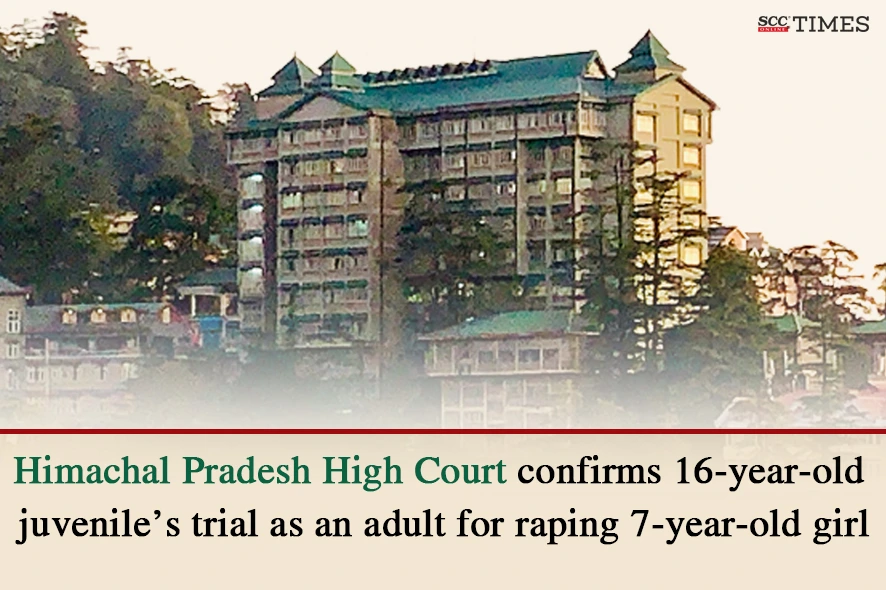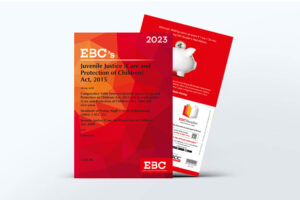Himachal Pradesh High Court: The present revision petition was directed against the judgment dated 10-06-2024, passed by the Sessions Judge (‘Appellate Court’), vide which the order passed by the Juvenile Justice Board (‘JJB’), of trying the petitioner (accused) as an adult for raping a 7-year-old girl, was upheld. A Single Judge Bench of Rakesh Kainthla, J., observed that both the subordinate courts had rightly held that the accused had sufficient mental and physical capacity to know the nature and consequences of his act and therefore, dismissed the present revision petition.
Background:
The police presented a challan against the accused for committing an offence punishable under Section 376 of the Penal Code, 1860 (‘IPC’) and Section 4 of the Protection of Children from Sexual Offences Act, 2012 (‘POCSO Act’) against the victim, aged 7 years.
The 7-year-old victim had gone to the accused’s house to play and when she returned, her mother called her husband at about 2:30 p.m., informing him that the victim had stomach pain. Upon inquiry, the victim revealed that the accused had raped her in a cowshed, then took her to his house, gave her water, and raped her again. He cleaned her blood and threatened that he would not play with her if she reported the incident to anyone. The police registered an FIR and conducted the investigation wherein the accused was found to be aged 16 years, one month and 23 days at the time of the incident and hence, the charge-sheet was filed before the JJB.
The JJB conducted a preliminary assessment under Section 15 of the Juvenile Justice (Care and Protection of Children) Act, 2015 (‘JJ Act’). The Medical Board found the accused had an IQ of 92, had mental and physical capacity, and understood the consequences of his actions. Based on this, the JJB referred the case to the Children’s Court to try him as an adult. The accused appealed the JJB’s decision, but the Appellate Court upheld the order, allowing the trial as an adult to proceed.
The accused submitted that the offence was committed on 12-02-2021, but he was examined by the Medical Board on 24-02-2022, which defeated the object and mandate of Sections 14 and 15 of the JJ Act. The inquiry was not completed within three months as provided under Section 14(3) of the JJ Act and further the documents of the case were also not supplied to the Medical Board, which vitiated its conclusion. The Medical Board had given its opinion regarding the accused’s mental capacity but not his physical capacity. The accused contended that the Courts below erred in ordering that he should be tried as an adult and therefore, he prayed that the judgments be set aside.
However, the respondent alleged that the period of three months provided under Section 14(3) of the JJ Act was not mandatory and there was no infirmity in the judgments passed.
Analysis and Decision:
The Court referred to Malkeet Singh Gill v. State of Chhattisgarh, (2022) 8 SCC 204, wherein the Supreme Court held that the revisional court did not exercise an appellate jurisdiction and it could only rectify the patent defect, errors of jurisdiction or the law. This position was reiterated in State of Gujarat v. Dilipsinh Kishorsinh Rao, (2023) 17 SCC 688. The Court also cited Kishan Rao v. Shankargouda, (2018) 8 SCC 165, wherein it was observed that it was impermissible for the High Court to reappreciate the evidence and come to its conclusions in the absence of any perversity.
The Court relied on the Supreme Court’s decision in X (Juvenile) v. State of Karnataka, (2024) 8 SCC 473, and held that the time-period of three months to complete the inquiry was directory and not mandatory, and therefore, the submission that the proceedings were vitiated due to non-completion of the inquiry within three months could not be accepted.
The Court noted that Section 15 of the JJ Act provided for the preliminary assessment of a child who had completed the age of 16 years and had committed a heinous offence. It read that the Board should conduct the preliminary assessment regarding the mental and physical capacity of the child to commit the crime, his ability to understand the consequences of the offence and the circumstances in which the crime was allegedly committed.
The Court referred to Barun Chandra Thakur v. Bholu, (2023) 12 SCC 401, wherein it was observed that intelligence was one of the factors to determine the mental capacity of the juvenile and concluded that the JJB was justified in relying upon the Medical Board’s report regarding the IQ of the accused. The Court noted that the JJB relied upon the MLC of the accused, in which it was specifically mentioned that there was nothing to suggest that he was unable to perform sexual intercourse. It also relied upon the social investigation report to hold that the accused did not suffer from any mental illness or parental neglect.
The Court opined that the JJB’s findings could not be said to be bad as the accused’s conduct to repeatedly raping the victim, cleaning the blood and threatening her not to reveal the incident to any person, showed that he was aware of the consequences of his act and wanted to conceal its commission.
The Court rejected the argument that the Medical Board’s assessment was invalid as the case history was not submitted to it and clarified that the Medical Board’s role was to evaluate the mental capacity of the accused, which it did by determining his IQ as 92 and confirming that he had sufficient understanding of his actions. Further, the JJB had interacted with the accused and went through the case file and since the JJB was responsible for assessing both mental and physical capacity to commit the crime, the documents not being sent to the Medical Board did not invalidate its report.
Based on the above analysis, the Court found no infirmity in the judgment passed by the Courts below and dismissed the present petition.
[V (a juvenile) v. State of H.P., 2025 SCC OnLine HP 3353, decided on 28-07-2025]
Advocates who appeared in this case:
For the Petitioner: Harish Sharma, Advocate.
For the Respondent: Ajit Sharma, Deputy Advocate General.





